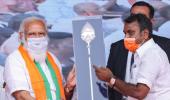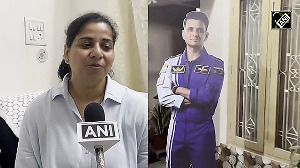AIADMK coordinator O Panneerselvam is said to be upset at his son Raveendranath Kumar, a Lok Sabha MP, being denied a ministerial chance for a second time in a row, beginning with the formation of Modi 2.0 in 2019, reveals N Sathiya Moorthy.

The induction of the Bharatiya Janata Party's Tamil Nadu president Dr Loganathan Murugan as a minister of state when Prime Minister Narendra Modi effected a major shake-up of his ministry on Wednesday evening came as a surprise to his supporters and detractors, both within the state party and outside.
It is indicative of the shape of things to come in the state party unit, where the central leadership began forcibly passing on the baton from entrenched veterans to the tentative younger generation leaders some time ago.
In doing so, the national leadership has indicated that it is looking beyond election 2024 at least in 'Dravidian' Tamil Nadu, where it obviously hopes to continue 'with', if not 'in', the All India Anna Dravida Munnetra Kazhagam alliance.
'I see it as an opportunity to serve the state,' Murugan told Tamil newsmen after the Rashtrapati Bhavan ceremony. A PhD in law from the University of Madras, the 44-year-old minister has since been allocated the wide-spectrum fisheries, animal husbandry and dairying departments along with the prestigious information and broadcasting portfolio.
Together, they are as much a challenge for the first-time minister as much they provide an opportunity for him to prove his mettle. On the fisheries front especially, he will have both opportunities and challenges vis-a-vis the Sri Lankan fishers' issue.
On pan-Tamil ideological issues, especially against the ruling DMK in the state, he has made his position clear, which has also been that of his party, through his two-year term as state party chief. But on those like the Cauvery water dispute with BJP-ruled Karnataka, as at present, his promise to 'serve' Tamil Nadu may come under strain.
Murugan's induction is being attributed to the party winning back four seats in the state assembly in the April elections after years, though in the company of the much stronger AIADMK and relatively better-off Pattali Makkal Katchi, among others. True as it may sound, there were specific reasons and enabling circumstances for each one of them, independent of his leadership.
Supporters argue how Murugan as state president had electrified the party by 'inventing' religion-centric political issues like the Vel Yatra and protests against the Karuppar Kootam YouTube channel, which only loners like former national secretary H Raja were highlighting.
But silent detractors argue that Murugan was only talking even more forcibly to the party's committed voters, and the issues he flagged may have only put off new voters who might have leaned closer to the Modi leadership.
It may never be put on record, but Murugan, a Dalit from the Arunthathiyar sub-sect, either had it in him or was at the right time in the state party's evolution away from the stranglehold of early Brahiminical leaders, that he weathered all caste-centric storms over his appointment as state party chief.
Before Murugan, the late Dr K P Kirubanidhi, a medical doctor, was the only other Dalit chief of the state BJP, beginning 2000, when the party was also in power at the Centre.
While handing over charge to his successor two years later, Kribunanidhi openly shed tears at the state party general council meeting, listing out the humiliation meted out to him during his tenure. Included in the list was the way he was denied access to the state party president's cabin at the Chennai HQ -- just as it continues to happen for Dalit panchayat presidents in 'Dravidian' Tamil Nadu, to date.
Upset by the continued neglect, Kirubanidhi joined the then ruling DMK in the presence of then chief minister, the late M Karunanidhi, before being persuaded by state BJP chief, Pon Radhakrishnan, to return to the parent fold, all of it in early 2011.
As a first-time poll-contender, Murugan, however, lost his seat to the DMK rival by around 1,300 votes. Hence, it is safe to assume other reasons for his ministerial induction, it being the desire of the national leadership to snatch it away from entrenched sections in a continuing bid to pump in fresh blood into the state party.
That much became visible with Murugan's elevation as the state party president in March 2020, after keeping the post vacant for seven long months. Earlier, Tamizhisai Soundararajan, a relative outsider to the state leadership tussle, had been given an extended term despite the party not making a mark in the 2016 assembly polls. She is at present the governor of Telangana, and Murugan filled the vacancy caused by her exit in the TN unit.
Speculation is already on about a successor to Murugan, as the party constitution forbids leaders from holding two positions. K Annamalai, the equally surcharged ex-IPS officer from the Karnataka cadre, is the front-runner. The 42-year-old had lost his first outing in the assembly polls from native Aravakurichi by close to 25,000 votes. Other names are also doing the rounds, but going by the current mood of Team Modi, they may be looking for a young technocrat or another professional, compared to rank-and-file leaders.
Such a decision implies that the BJP may not be looking for immediate electoral gains on its own, beginning with the 2024 parliamentary polls. Considering that the party may still want to have a relatively substantial number from the 'Dravidian' state, also due to anticipated reversals, big or small, in traditional northern strongholds, the continuance of the AIADMK-PMK alliance is taken for granted.
Though on-again-off-again media speculation still keeps talking about some arrangement being worked out with the DMK, it would have to wait until after election 2024, after ensuring the possibility of it drifting away from the existing Congress ally. It’s still a very a tall order.
The real loser in Murugan's induction is not any other BJP aspirant from the state, of which there are not many with legitimate claims. External Affairs Minister Subrahmanyam Jaishankar and Finance Minister Nirmala Sitharaman are Tamils, and the latter was even rumoured to be the BJP's chief ministerial candidate in 2016 but when that did not happen, she too reduced her visits to the state where she had earlier undertaken extensive weekend tours, as defence minister.
As incumbent MoS, Pon Radhakrishnan's luck ran dry after he lost two Lok Sabha polls in a row, including a by-election this year, from his native Kanyakumari constituency.
Thus, the real loser comes from outside the state BJP, namely, the AIADMK ally. Party coordinator O Panneerselvam especially is said to be upset at his LS member-son Raveendranath Kumar being denied the chance for a second time in a row, beginning with the formation of Modi 2.0 in 2019.
The OPS camp blames it on the rival faction led by former chief minister Edappadi K Palaniswami, who is also the joint coordinator of the party. They see the unprovoked and 'wantonly leaked' comments of ex-minister C Ve Shanmugam, attributing the assembly poll defeat to the BJP alliance, as EPS's handiwork.
On the morning of the swearing-in, OPS issued a statement, with an English translation for the first time ever, denying Shanmugam's allegation. Once the so-called EPS deed was done, the latter joined hands with OPS to issue one of those rare joint statements, swearing by the BJP alliance.
Yet, there was nothing to suggest that the BJP was keen on inducting the AIADMK into the national alliance, given its post-poll 2019 attempts at including a party minister or two (as MoS) at the Centre and the faction feud that put paid to the same.
There is also little or no chance for the AIADMK's re-induction any time soon, as Modi is not known to shake up his team every now and again.
With that also has crashed the hopes of other allies like the PMK's Anbumani Ramadoss and the Tamil Maanila Congress's G K Vasan. Both held Cabinet berths under the Manmohan Singh-led UPA regime, but the Modi-Shah duo seems unmoved. Between them, Anbumani, a medical doctor, has graft cases against him, and Vasan, has pending investigations by central agencies.
N Sathiya Moorthy, veteran journalist, policy analyst and author, is Distinguished Fellow and Head-Chennai Initiative, Observer Research Foundation.











